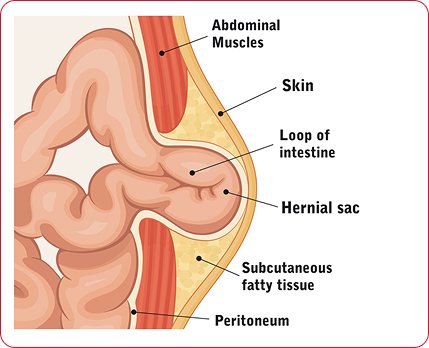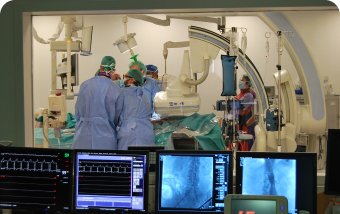Umbilical Hernia Surgery in Spain – Advanced and Minimally Invasive Repair
Umbilical hernia surgery is a simple and effective procedure to repair a hernia near the belly button, preventing pain and potential complications. Using minimally invasive or open techniques, the weakened abdominal wall is reinforced with sutures or a mesh implant for long-term stability.
Tell us about your case
Please let us know what we can help you with and we will get in touch with you shortly about your case.
Umbilical hernia surgery is a simple and effective procedure to repair a hernia near the belly button, preventing pain and potential complications. Using minimally invasive or open techniques, the weakened abdominal wall is reinforced with sutures or a mesh implant for long-term stability.
Tell us about your case
Please let us know what we can help you with and we will get in touch with you shortly about your case.
What is Umbilical Inguinal Hernia Surgery?
Umbilical hernia surgery is a surgical procedure to repair a hernia near the belly button, where a portion of the intestine or fatty tissue pushes through a weakened area of the abdominal wall. This condition can cause pain, discomfort, and complications, such as strangulation, where the hernia becomes trapped and cuts off blood supply to the intestines. At Ribera Health Group, our surgeons use advanced techniques, including minimally invasive laparoscopic surgery, to ensure a safe and effective repair with minimal recovery time.
Who can benefit from Umbilical Hernia Surgery?
Umbilical hernia surgery is recommended for patients experiencing:
- A noticeable bulge near the belly button that increases in size.
- Pain or discomfort, especially when coughing, bending, or lifting.
- Recurring or enlarging hernias that could lead to complications.
- Severe cases where the hernia becomes trapped (incarcerated) or strangulated, requiring urgent surgery.
How is Umbilical Hernia Surgery performed?
During umbilical hernia surgery, the surgeon reinforces the weakened abdominal wall to prevent the hernia from recurring. The procedure can be performed in two ways:
- Laparoscopic (Minimally Invasive) Surgery: The surgeon makes small incisions and uses a tiny camera and surgical instruments to repair the hernia. A reinforcement mesh is often placed to strengthen the area. This method allows for smaller scars, faster recovery, and reduced post-operative discomfort.
- Open Surgery: The surgeon makes a single larger incision over the hernia site, repairs the hernia, and may place a reinforcement mesh if needed. This approach is often used for larger or more complex hernias.

The choice of technique depends on the patient’s condition and the surgeon’s expertise. Most patients can return home the same day after surgery and resume normal activities within one to two weeks.
Recovery Time and Success Rates
Recovery Time: Recovery from umbilical hernia surgery depends on the technique used and the patient’s overall health:
- Laparoscopic surgery: Patients can return home the same day and resume light activities within a few days, with full recovery in 1 to 2 weeks.
- Open surgery: Recovery may take slightly longer, with most patients resuming normal activities within 2 to 4 weeks.
- In both cases, strenuous activities and heavy lifting should be avoided for at least 4 to 6 weeks to allow proper healing.
Success Rates: Umbilical hernia repair is a highly successful procedure, with most patients experiencing permanent relief from discomfort and a low risk of recurrence. At Ribera Health Group, we use advanced surgical techniques and reinforcement mesh to provide long-lasting results and optimal patient outcomes.
Advantages Over Other Hospitals
- Minimally invasive laparoscopic techniques for faster recovery and reduced scarring.
- Highly skilled surgeons specializing in hernia repair and abdominal wall reconstruction.
- Advanced surgical mesh technology to lower recurrence rates and improve long-term outcomes.
- Personalized post-surgery care, including pain management and rehabilitation guidance.
- Dedicated international patient support for a seamless experience, from consultation to recovery.
Before Umbilical Hernia Surgery
Pre-Procedure Medical Preparation
- Patients will undergo a pre-surgical evaluation, including physical examination, imaging tests (such as ultrasound or CT scan), and blood tests if needed.
- Your doctor may adjust or stop certain medications, especially blood thinners, to reduce the risk of bleeding during surgery.
Fasting
- Fasting is required for at least 6 to 8 hours before surgery to reduce anesthesia-related complications.
Medications
- Your doctor may prescribe antibiotics to reduce the risk of infection.
- Avoid taking anti-inflammatory medicine, or blood thinners before surgery unless instructed otherwise.
Stop Smoking and Alcohol
- Stop smoking and avoid alcohol at least two weeks before surgery to promote healing and reduce the risk of complications.
Exercise and Lifestyle Preparation
- Engage in light physical activity before surgery to maintain overall health.
- Avoid lifting heavy objects to prevent worsening of the hernia.
What to Bring to the Hospital
- Wear loose, comfortable clothing for your hospital visit.
- Remove jewelry, piercings, and accessories before admission.
Confirm Consent and Questions
- Review and sign consent forms before surgery.
Discuss any concerns or last-minute questions with your doctor.
After Umbilical Hernia Surgery
Hospital Recovery
- Laparoscopic surgery patients typically return home the same day.
- Open surgery patients may require a short hospital stay if necessary.
- Expect mild swelling, bruising, or discomfort, which improves within a few days.
Medications
- Continue pain relievers and any prescribed medications as directed.
- Avoid over-the-counter medications without consulting your doctor.
Wound Care
- Keep the surgical incision sites clean and dry.
- Follow your doctor’s instructions for dressing changes and wound care.
- Watch for signs of infection, such as redness, swelling, or unusual discharge.
Physical Activity
- Avoid heavy lifting, sudden movements, or intense physical activities for at least 4 to 6 weeks.
- Walking and light movements are encouraged to promote circulation and healing.
Diet and Lifestyle
- Maintain a healthy diet rich in fiber and fluids to prevent constipation, which can strain the surgical area.
- Avoid heavy, greasy, or processed foods in the first few days after surgery.
Recognizing Warning Signs
Seek immediate medical attention if you experience:
- Severe or worsening pain that does not improve with medication.
- Fever or signs of infection at the incision site.
- Swelling, difficulty urinating, or signs of hernia recurrence.
Rehabilitation and Recovery
- Most patients can resume light activities within a few days and return to work within 1 to 2 weeks, depending on the type of surgery and job requirements.
The Life-Changing Benefits of Umbilical Hernia Surgery
Umbilical hernia surgery is a highly effective and minimally invasive procedure that repairs the abdominal wall, preventing complications and restoring comfort. At Ribera Health Group, we utilize advanced surgical techniques to ensure a safe, efficient, and long-lasting repair. Undergoing umbilical hernia surgery provides a range of benefits, including:
Permanent Relief from Discomfort
Hernia repair eliminates pain, pressure, and bulging in the abdominal area, allowing patients to move freely without discomfort.
Prevention of Serious Complications
If left untreated, umbilical hernias can grow larger or become strangulated, cutting off blood supply and requiring emergency surgery. Early repair prevents these risks and ensures better long-term health.
Minimally Invasive Techniques for Faster Recovery
Our laparoscopic and robotic-assisted procedures use small incisions, resulting in minimal scarring, reduced pain, and quicker healing compared to traditional open surgery.
Improved Strength and Abdominal Support
By reinforcing the weakened abdominal wall, hernia repair restores core strength and stability, reducing the risk of future hernias and improving physical function.
Lower Risk of Recurrence with Advanced Mesh Technology
We use state-of-the-art surgical mesh for added reinforcement, significantly lowering the risk of hernia recurrence and ensuring long-term success.
Suitable for a Wide Range of Patients
Umbilical hernia surgery is a safe and effective option for individuals of all ages experiencing pain, discomfort, or functional limitations, offering a lasting improvement in quality of life.
Choosing Ribera Health Group for your umbilical hernia repair means selecting expert surgeons, cutting-edge techniques, and patient-centered care. Take the first step toward a pain-free, active future with our specialized surgical team.
How long does umbilical hernia surgery take?
Inguinal hernia surgery typically takes 30 to 60 minutes, depending on whether it is performed laparoscopically or as an open procedure.
What is the recovery time after umbilical hernia surgery?
- Laparoscopic surgery: Most patients can return to light activities within a few days and resume normal activities within 1 to 2 weeks.
- Open surgery: Recovery may take 2 to 4 weeks, with a gradual return to normal activities.
Will I need to stay in the hospital after surgery?
Most umbilical hernia repairs are outpatient procedures, meaning patients can go home the same day. In rare cases, a short hospital stay may be required for larger or more complex hernias.
What are the risks of umbilical hernia surgery?
Although rare, risks may include infection, bleeding, mesh-related complications, or hernia recurrence. At Ribera Health Group, we use advanced surgical techniques and high-quality mesh to minimize risks and improve long-term success.
When can I return to work and daily activities?
Patients with sedentary jobs can usually return to work within 1 to 2 weeks.
Those with physically demanding jobs or requiring heavy lifting may need 4 to 6 weeks before resuming full activity.
Can an umbilical hernia come back after surgery?
The risk of recurrence is low, especially when using reinforced surgical mesh. However, maintaining a healthy weight and avoiding excessive strain can help prevent future hernias.
Will I need pain medication after surgery?
Mild discomfort is normal after surgery, and pain relievers will be prescribed as needed. Most patients experience significant relief within a few days.
Will I need a follow-up appointment after surgery?
Yes, a follow-up appointment is typically scheduled 1 to 2 weeks after surgery to monitor healing and ensure a successful recovery.
Can I exercise after umbilical hernia surgery?
Light walking is encouraged soon after surgery to promote healing.
Strenuous activities and heavy lifting should be avoided for 4 to 6 weeks to allow the abdominal muscles to heal properly.
Does Ribera Health Group offer support for international patients?
Yes! Our International Patient Services team provides multilingual support, travel assistance, and post-surgical follow-up care to ensure a smooth and stress-free experience.
About Umbilical Hernia Surgery
What is Umbilical Inguinal Hernia Surgery?
Umbilical hernia surgery is a surgical procedure to repair a hernia near the belly button, where a portion of the intestine or fatty tissue pushes through a weakened area of the abdominal wall. This condition can cause pain, discomfort, and complications, such as strangulation, where the hernia becomes trapped and cuts off blood supply to the intestines. At Ribera Health Group, our surgeons use advanced techniques, including minimally invasive laparoscopic surgery, to ensure a safe and effective repair with minimal recovery time.
Who can benefit from Umbilical Hernia Surgery?
Umbilical hernia surgery is recommended for patients experiencing:
- A noticeable bulge near the belly button that increases in size.
- Pain or discomfort, especially when coughing, bending, or lifting.
- Recurring or enlarging hernias that could lead to complications.
- Severe cases where the hernia becomes trapped (incarcerated) or strangulated, requiring urgent surgery.
How is Umbilical Hernia Surgery performed?
During umbilical hernia surgery, the surgeon reinforces the weakened abdominal wall to prevent the hernia from recurring. The procedure can be performed in two ways:
- Laparoscopic (Minimally Invasive) Surgery: The surgeon makes small incisions and uses a tiny camera and surgical instruments to repair the hernia. A reinforcement mesh is often placed to strengthen the area. This method allows for smaller scars, faster recovery, and reduced post-operative discomfort.
- Open Surgery: The surgeon makes a single larger incision over the hernia site, repairs the hernia, and may place a reinforcement mesh if needed. This approach is often used for larger or more complex hernias.

The choice of technique depends on the patient’s condition and the surgeon’s expertise. Most patients can return home the same day after surgery and resume normal activities within one to two weeks.
Relevant Data
Recovery Time and Success Rates
Recovery Time: Recovery from umbilical hernia surgery depends on the technique used and the patient’s overall health:
- Laparoscopic surgery: Patients can return home the same day and resume light activities within a few days, with full recovery in 1 to 2 weeks.
- Open surgery: Recovery may take slightly longer, with most patients resuming normal activities within 2 to 4 weeks.
- In both cases, strenuous activities and heavy lifting should be avoided for at least 4 to 6 weeks to allow proper healing.
Success Rates: Umbilical hernia repair is a highly successful procedure, with most patients experiencing permanent relief from discomfort and a low risk of recurrence. At Ribera Health Group, we use advanced surgical techniques and reinforcement mesh to provide long-lasting results and optimal patient outcomes.
Advantages Over Other Hospitals
- Minimally invasive laparoscopic techniques for faster recovery and reduced scarring.
- Highly skilled surgeons specializing in hernia repair and abdominal wall reconstruction.
- Advanced surgical mesh technology to lower recurrence rates and improve long-term outcomes.
- Personalized post-surgery care, including pain management and rehabilitation guidance.
- Dedicated international patient support for a seamless experience, from consultation to recovery.
Before and After Care
Before Umbilical Hernia Surgery
Pre-Procedure Medical Preparation
- Patients will undergo a pre-surgical evaluation, including physical examination, imaging tests (such as ultrasound or CT scan), and blood tests if needed.
- Your doctor may adjust or stop certain medications, especially blood thinners, to reduce the risk of bleeding during surgery.
Fasting
- Fasting is required for at least 6 to 8 hours before surgery to reduce anesthesia-related complications.
Medications
- Your doctor may prescribe antibiotics to reduce the risk of infection.
- Avoid taking anti-inflammatory medicine, or blood thinners before surgery unless instructed otherwise.
Stop Smoking and Alcohol
- Stop smoking and avoid alcohol at least two weeks before surgery to promote healing and reduce the risk of complications.
Exercise and Lifestyle Preparation
- Engage in light physical activity before surgery to maintain overall health.
- Avoid lifting heavy objects to prevent worsening of the hernia.
What to Bring to the Hospital
- Wear loose, comfortable clothing for your hospital visit.
- Remove jewelry, piercings, and accessories before admission.
Confirm Consent and Questions
- Review and sign consent forms before surgery.
Discuss any concerns or last-minute questions with your doctor.
After Umbilical Hernia Surgery
Hospital Recovery
- Laparoscopic surgery patients typically return home the same day.
- Open surgery patients may require a short hospital stay if necessary.
- Expect mild swelling, bruising, or discomfort, which improves within a few days.
Medications
- Continue pain relievers and any prescribed medications as directed.
- Avoid over-the-counter medications without consulting your doctor.
Wound Care
- Keep the surgical incision sites clean and dry.
- Follow your doctor’s instructions for dressing changes and wound care.
- Watch for signs of infection, such as redness, swelling, or unusual discharge.
Physical Activity
- Avoid heavy lifting, sudden movements, or intense physical activities for at least 4 to 6 weeks.
- Walking and light movements are encouraged to promote circulation and healing.
Diet and Lifestyle
- Maintain a healthy diet rich in fiber and fluids to prevent constipation, which can strain the surgical area.
- Avoid heavy, greasy, or processed foods in the first few days after surgery.
Recognizing Warning Signs
Seek immediate medical attention if you experience:
- Severe or worsening pain that does not improve with medication.
- Fever or signs of infection at the incision site.
- Swelling, difficulty urinating, or signs of hernia recurrence.
Rehabilitation and Recovery
- Most patients can resume light activities within a few days and return to work within 1 to 2 weeks, depending on the type of surgery and job requirements.
Benefits
The Life-Changing Benefits of Umbilical Hernia Surgery
Umbilical hernia surgery is a highly effective and minimally invasive procedure that repairs the abdominal wall, preventing complications and restoring comfort. At Ribera Health Group, we utilize advanced surgical techniques to ensure a safe, efficient, and long-lasting repair. Undergoing umbilical hernia surgery provides a range of benefits, including:
Permanent Relief from Discomfort
Hernia repair eliminates pain, pressure, and bulging in the abdominal area, allowing patients to move freely without discomfort.
Prevention of Serious Complications
If left untreated, umbilical hernias can grow larger or become strangulated, cutting off blood supply and requiring emergency surgery. Early repair prevents these risks and ensures better long-term health.
Minimally Invasive Techniques for Faster Recovery
Our laparoscopic and robotic-assisted procedures use small incisions, resulting in minimal scarring, reduced pain, and quicker healing compared to traditional open surgery.
Improved Strength and Abdominal Support
By reinforcing the weakened abdominal wall, hernia repair restores core strength and stability, reducing the risk of future hernias and improving physical function.
Lower Risk of Recurrence with Advanced Mesh Technology
We use state-of-the-art surgical mesh for added reinforcement, significantly lowering the risk of hernia recurrence and ensuring long-term success.
Suitable for a Wide Range of Patients
Umbilical hernia surgery is a safe and effective option for individuals of all ages experiencing pain, discomfort, or functional limitations, offering a lasting improvement in quality of life.
Choosing Ribera Health Group for your umbilical hernia repair means selecting expert surgeons, cutting-edge techniques, and patient-centered care. Take the first step toward a pain-free, active future with our specialized surgical team.
FAQs
How long does umbilical hernia surgery take?
Inguinal hernia surgery typically takes 30 to 60 minutes, depending on whether it is performed laparoscopically or as an open procedure.
What is the recovery time after umbilical hernia surgery?
- Laparoscopic surgery: Most patients can return to light activities within a few days and resume normal activities within 1 to 2 weeks.
- Open surgery: Recovery may take 2 to 4 weeks, with a gradual return to normal activities.
Will I need to stay in the hospital after surgery?
Most umbilical hernia repairs are outpatient procedures, meaning patients can go home the same day. In rare cases, a short hospital stay may be required for larger or more complex hernias.
What are the risks of umbilical hernia surgery?
Although rare, risks may include infection, bleeding, mesh-related complications, or hernia recurrence. At Ribera Health Group, we use advanced surgical techniques and high-quality mesh to minimize risks and improve long-term success.
When can I return to work and daily activities?
Patients with sedentary jobs can usually return to work within 1 to 2 weeks.
Those with physically demanding jobs or requiring heavy lifting may need 4 to 6 weeks before resuming full activity.
Can an umbilical hernia come back after surgery?
The risk of recurrence is low, especially when using reinforced surgical mesh. However, maintaining a healthy weight and avoiding excessive strain can help prevent future hernias.
Will I need pain medication after surgery?
Mild discomfort is normal after surgery, and pain relievers will be prescribed as needed. Most patients experience significant relief within a few days.
Will I need a follow-up appointment after surgery?
Yes, a follow-up appointment is typically scheduled 1 to 2 weeks after surgery to monitor healing and ensure a successful recovery.
Can I exercise after umbilical hernia surgery?
Light walking is encouraged soon after surgery to promote healing.
Strenuous activities and heavy lifting should be avoided for 4 to 6 weeks to allow the abdominal muscles to heal properly.
Does Ribera Health Group offer support for international patients?
Yes! Our International Patient Services team provides multilingual support, travel assistance, and post-surgical follow-up care to ensure a smooth and stress-free experience.
Doctors
Ribera’s General Surgery Department is led by a team of renowned specialists with extensive experience in minimally invasive, laparoscopic, and complex surgical procedures. Our experts are at the forefront of surgical innovation, utilizing state-of-the-art technology and advanced techniques to ensure precision, safety, and optimal patient outcomes. With a commitment to excellence and personalized care, we provide world-class surgical solutions tailored to each patient’s needs.
Facilities
Our hospitals and centers are equipped with cutting-edge technology and modern installations designed to deliver the highest standards of medical care. We offer comfortable patient rooms, welcoming environments, and amenities tailored to ensure a smooth and stress-free healthcare experience for you and your loved ones.
Why choose Ribera for your umbilical hernia surgery?
At Ribera Health Group, we combine expertise, innovation, and patient-centered care to ensure safe, effective, and long-lasting hernia repair. Here’s why Ribera is your trusted choice for umbilical hernia surgery:

World-Class Expertise
Our team of highly skilled surgeons specializes in umbilical hernia repair using minimally invasive and advanced surgical techniques. With extensive experience, we provide precise, effective, and long-lasting hernia repairs.

State-of-the-Art Technology
Ribera utilizes cutting-edge laparoscopic and robotic-assisted techniques, ensuring smaller incisions, minimal scarring, reduced pain, and faster recovery times. Our approach maximizes safety and surgical precision.

Comprehensive Digestive Care
From diagnosis to post-surgical follow-up, Ribera offers an integrated approach to hernia treatment, ensuring a seamless experience and long-term success in preventing recurrence or complications.

Patient-Centered Approach
We prioritize your comfort and well-being. Our dedicated care team takes the time to understand your concerns, answer your questions, and guide you through each step of your treatment with compassion and professionalism.

International Patient Support
For our international patients, we provide multilingual assistance, travel support, and personalized care coordination, ensuring a smooth and stress-free surgical experience.

Proven Results
With high success rates and low recurrence risk, umbilical hernia surgery at Ribera provides lasting relief from pain and discomfort, helping patients return to normal activities quickly and safely.
What our patients say about us






Other treatments:
Trust in world-class surgical care at Ribera
Receive expert surgical care with minimally invasive techniques and personalized treatment plans for a faster recovery and better outcomes. Start your journey to improved health today.


























